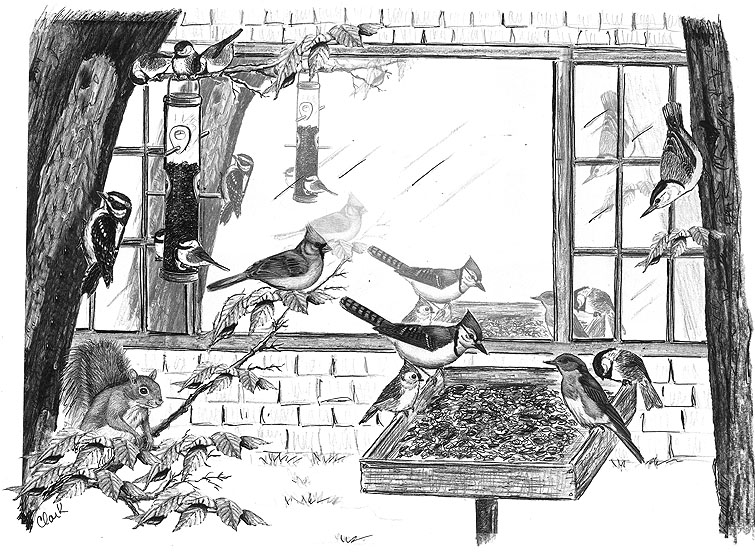
Dear Bird Folks,
Yet another gorgeous cardinal lies dead on my patio, the second one this year, plus a Blue Jay and a Downy Woodpecker. Our patio is surrounded by five large sliding glass doors. Evidently the birds are seeing their reflection at certain times of the day. Please advise me how to keep from killing more birds. I love the birds but I feel like a murderer.
-Alice, Bass River, MA
Calm Down Alice,
You are not a murderer. Well, not in this case anyway. I don’t know your history or what else you have been up to, but my guess is that anyone concerned about a cardinal’s welfare does not have any murders on their record or at least very few.
The problem you have described is one of the biggest problems facing birds throughout the developed world. Think about this, if four birds died from just your one house, there could very well be four dead birds for every building in the United States. That would equal, um, well, a lot of dead birds and maybe more. It is estimated that close to 950 million birds die from window collisions each year in this country alone. Without a doubt window strikes are one of the greatest contributors to bird deaths. It is right up there with death caused by outdoor cats, habitat destruction and eating undercooked worms.
You were right Alice when you mentioned reflections being the cause, but it is not the birds seeing their own reflection that is the problem, as it is when territorial birds attack the windows. It is the reflection of the trees and the sky that causes the trouble. Your window acts as a mirror and the birds mistakenly feel that they can fly to a tree that is actually an image on a very hard pane of glass.
Since the victim birds that you have described are all feeder birds, it is pretty safe to assume that you have bird feeders. As strange as it may seem, the best way to protect feeder birds is to move your feeders closer to your windows. When feeders are only two or three feet from a window the feeding birds are well aware of its presence. Even if a bird doesn’t realize the window is there because it happens to be severely nearsighted or just stupid, the closeness of the window prevents the bird from flying into it with enough speed to do serious harm. Feeders that are fifteen or twenty feet from a window often cause the most problems.
In addition to moving your feeders closer to the house, there are several items that you can apply to your windows that will help break up the reflections and alert the birds to the danger. Before I get into it, it should be noted that any item that you use to break up reflections must go on the outside of the window. The problematic reflections also prevent the birds from seeing inside.
Hawk silhouettes have been used for years, but recent studies have questioned their effectiveness. Though items have hit the market, the problem is that many people who live in glass houses, hate to spoil their million dollar view by putting decals on their windows. So a new “invisible” decal was developed. Birds have the ability to see ultraviolet, while us human dullards cannot. Some company made decals that look nearly invisible to us, but the birds are able to see them just fine.
Another new item is a bit more annoying to look at, but is probably the most effective. About ten years ago a lady told me that she virtually stopped all bird collisions with her windows by taping streamers of short ribbons on her windows. The flapping motion alerted the birds. Well, it is now ten years later and some company is selling a similar item that appears to be doing the job. The device is called “Feather Guard .” The package contains lengths of fishing line, with colored feathers tied on them. They are held onto the window with suction cups. The idea is that the loose feathers naturally catch a bird’s attention. Early reports are that this new product is indeed saving birds, plus they give your house a year round Mardi Gras look.
Over the years I have tried several items on my own windows, but I find that the lazy method works the best. I simply never wash any windows. After a few years the built up dirt and grime not only prevents the deadly reflections, but it gives me shade in the summer and adds a much needed layer of insulation in the winter. Once again laziness pays off, which is really lucky for me.